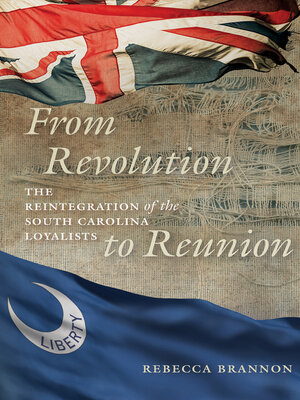From Revolution to Reunion
ebook ∣ The Reintegration of the South Carolina Loyalists
By Rebecca Brannon

Sign up to save your library
With an OverDrive account, you can save your favorite libraries for at-a-glance information about availability. Find out more about OverDrive accounts.
Find this title in Libby, the library reading app by OverDrive.



Search for a digital library with this title
Title found at these libraries:
| Library Name | Distance |
|---|---|
| Loading... |
This social history of post-Revolutionary South Carolina examines the successful reconciliation of Patriots and Loyalists.
The American Revolution was a vicious civil war fought between families and neighbors. Nowhere was this truer than in South Carolina. Yet, after the Revolution, South Carolina's victorious Patriots offered vanquished Loyalists a prompt and generous legal and social reintegration. From Revolution to Reunion investigates the way in which South Carolinians, Patriot and Loyalist, managed to reconcile their bitter differences and reunite to heal South Carolina and create a stable foundation for the new United States.
Rebecca Brannon considers rituals and emotions, as well as historical memory, to produce a complex and nuanced interpretation of the reconciliation process in post-Revolutionary South Carolina, detailing how Loyalists and Patriots worked together to heal their society. She frames the process in a larger historical context by comparing South Carolina's experience with that of other states.
Brannon highlights how Loyalists apologized but also became vital contributors to the new experiment in self-government and liberty. In return, the state government reinstated almost all the Loyalists by 1784. South Carolinians succeeded in creating a generous and lasting reconciliation between former enemies, but in the process they downplayed the dangers of civil war—which may have made it easier for South Carolinians to choose that path a second time.
The American Revolution was a vicious civil war fought between families and neighbors. Nowhere was this truer than in South Carolina. Yet, after the Revolution, South Carolina's victorious Patriots offered vanquished Loyalists a prompt and generous legal and social reintegration. From Revolution to Reunion investigates the way in which South Carolinians, Patriot and Loyalist, managed to reconcile their bitter differences and reunite to heal South Carolina and create a stable foundation for the new United States.
Rebecca Brannon considers rituals and emotions, as well as historical memory, to produce a complex and nuanced interpretation of the reconciliation process in post-Revolutionary South Carolina, detailing how Loyalists and Patriots worked together to heal their society. She frames the process in a larger historical context by comparing South Carolina's experience with that of other states.
Brannon highlights how Loyalists apologized but also became vital contributors to the new experiment in self-government and liberty. In return, the state government reinstated almost all the Loyalists by 1784. South Carolinians succeeded in creating a generous and lasting reconciliation between former enemies, but in the process they downplayed the dangers of civil war—which may have made it easier for South Carolinians to choose that path a second time.







